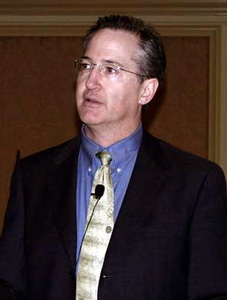|
Week of March 28, 2005 Special Report |
|
LOOKING FOR A PREVIOUS STORY? CHECK THE ARCHIVE.
Site Selection Bonus Coverage of Zach: The Future
Isn't What It Used to Be by RON STARNER, Site Selection Director of Publications
The problem with most business executives is that they pay more attention to things that change than to the things that don't, futurist David Zach told the IAMC Professional Forum in Charleston, S.C., March 23.
"The world is about continuity — things that don't change," said Zach, who holds a master's degree in future studies from the University of Houston and who previously worked at Johnson Controls and Northwestern Mutual Life in environmental scanning and strategic planning. "You can be too certain about the future. The key is to ask, 'What doesn't change? What never, ever changes?' " Only when you answer these questions can you properly anticipate, and prepare for, the future, Zach said. Complicating the matter is the fact that most people today are so open to changing ideas and philosophies that they no longer recognize the constant truths of the universe, the futurist said. "We are too vulnerable to predictions of the future. Your mind can be ripped to shreds if it's constantly open to everything. The ability to open your mind is what's important," he noted. Another problem is that most people can't discern the differences between fads, trends and principles. "Fads are safe to ignore but can be used as tactical tools. Trends are always real and based on strategic factors," Zach said. "Principles are systematic and foundational. They seldom if ever change." Also, he cautioned, don't be so overwhelmed with information that you lose sight of what truly matters in life. "Only intuition can protect us in an age of information," said Zach. "There is money in fads, wealth in trends and life in principles." On the subject of coming changes relevant to corporate real estate, Zach advised his audience to prepare for the following trends:
To better prepare for this future, Zach encouraged his audience to remember five principles:
©2004 Conway Data, Inc. All rights reserved. Data is from many sources and is not warranted to be accurate or current.
|
